How to Pass the BCBA Exam
Mastering Your Path to Certification: Strategies for the BCBA Exam

Understanding the Foundation of the BCBA Exam Preparation
Embarking on the journey to become a Board Certified Behavior Analyst (BCBA) requires rigorous preparation and a clear understanding of the exam’s structure, content, and policies. This guide offers comprehensive insights into how to successfully navigate the exam process, from understanding what the exam entails to effective study techniques and test-day strategies.
Overview of the BCBA Exam Structure
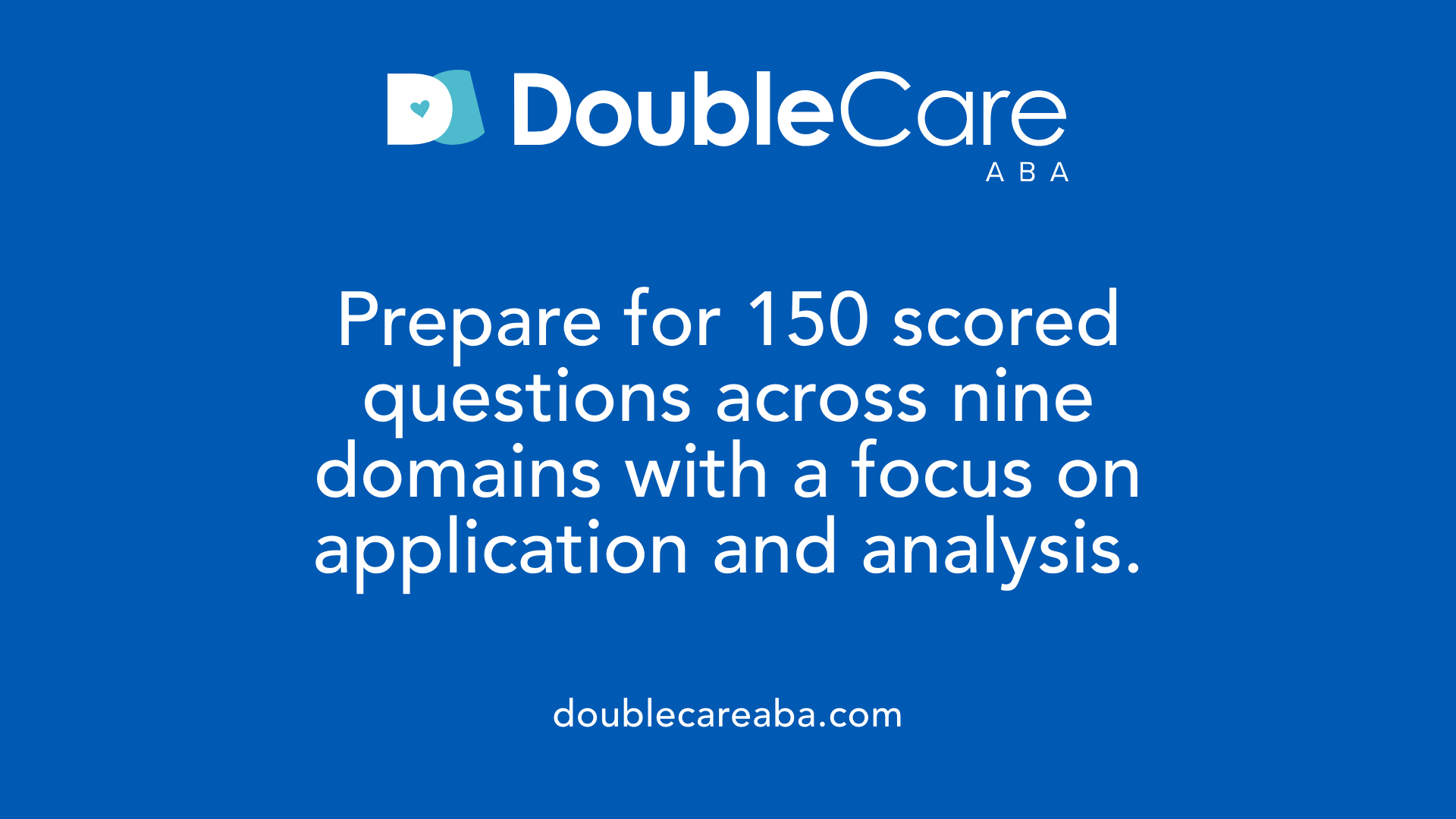
What is the structure and content of the BCBA exam?
The BCBA (Board Certified Behavior Analyst) exam is designed to assess the knowledge and practical skills required for entry-level behavior analysts. It is a four-hour, computer-based test administered at Pearson VUE testing centers, which are located in multiple countries to facilitate accessibility.
The exam includes approximately 150 scored multiple-choice questions, along with 10 unscored pilot questions used for future research and calibration. These questions are scenario-based and often focus on applying concepts, analyzing data, and understanding behavioral principles. The exam is organized into nine content domains according to the BACB's ongoing updates, which will shift to a new 6th edition in 2025. Current domains include areas such as philosophical foundations, ethics, measurement, assessment, behavior change procedures, and supervision.
The total number of questions is split into two sections, each containing 80 questions. This format helps manage candidate stamina and allows for a better evaluation of knowledge across different question types, which include both recall and application-based items. Scoring is based on a scaled score using the modified Angoff method, ensuring fairness and consistency across different test forms.
To succeed, candidates are advised to review the official exam blueprint, use various study materials like mock exams, and focus on understanding practical applications of behavioral principles. Achieving a score of at least 70% is necessary to pass, confirming the candidate's competence in core behavior analysis practices.
Understanding the Role of the BACB and Certification Requirements
What are the eligibility requirements to sit for the BCBA exam?
Candidates seeking BCBA certification must meet several standards set by the BACB. These include holding a master's degree from an accredited institution, completing specific coursework in behavior analysis, and gaining supervised practical experience through fieldwork.
The coursework typically covers areas such as behavior principles, assessment strategies, and intervention procedures. Supervised fieldwork involves working under the supervision of a qualified professional to gain hands-on experience.
These eligibility criteria aim to ensure that candidates have both the theoretical knowledge and practical skills needed for effective practice. Meeting these requirements is essential before submitting an application for the certification exam.
Application process
Candidates must submit an application through the BACB, demonstrating that they meet all eligibility prerequisites. Once approved, they receive instructions for scheduling their exam at authorized Pearson VUE testing centers.
Supervised fieldwork
Supervised experience is a critical component of certification, involving direct practice in real-world settings. This experience helps candidates develop their skills in applying behavior analysis principles effectively and ethically.
Educational requirements
A minimum of a master's degree is required to qualify for the BCBA exam. The degree must be in a behavior analysis or related field, and candidates must complete designated coursework aligned with BACB standards.
This comprehensive process, including eligibility verification, supervised practical experience, and exam testing, ensures that only qualified individuals attain certification, maintaining high standards in the profession.
Effective Study Resources for the BCBA Exam
Preparing effectively for the BCBA exam involves utilizing a range of study resources tailored to various learning styles. One of the most reliable starting points is comprehensive study guides such as the 'BCBA Exam Study Guide' authored by Dr. Jamie Hughes-Lika. These guides organize the exam content and provide valuable tips for test-taking strategies.
Textbooks also play a vital role in understanding core concepts. The 'Cooper Book,' which covers behavior analysis principles, remains a popular choice among exam candidates. Supplementing reading with flashcard apps like Quizlet and Anki enhances retention of terminology and fundamental ideas.
Practicing with real exam questions is crucial. Full-length practice exams available through the BACB website or educational platforms like ABA Tech simulate the test environment and help identify areas needing improvement. These practice tools reinforce understanding, boost confidence, and improve time management skills.
Online courses and webinars offer interactive learning experiences. Platforms such as YouTube feature numerous tutorials explaining difficult concepts. Additionally, participating in study forums like Reddit or Facebook groups allows candidates to discuss topics, ask questions, and share resources.
Beyond content review, candidates benefit from reviewing the BACB’s Ethics Code, working through scenario-based questions, and organizing study materials digitally through tools like Evernote. Creating a study schedule and engaging in regular mock exams help build exam readiness.
For those seeking the most effective resources, searching for 'Best BCBA study resources and practice exams' yields top-rated guides, online courses, and practice tests tailored to current and upcoming exam formats.
Study Strategies for Effective Preparation
What strategies and tips are effective for passing the BCBA exam?
Preparing for the BCBA certification exam requires a strategic approach that combines thorough content review with practical testing skills. Candidates should start by developing a detailed study schedule that allocates ample time for reviewing the exam content areas, particularly the BACB’s 5th Edition Task List, which forms the basis for the exam. Emphasizing understanding ethical codes, especially Section E, is crucial, as these are frequently tested.
Regular practice with high-quality mock exams helps identify weak areas and familiarize candidates with the exam format. Using resources such as the Cooper textbook, question banks, and flashcards like SAFMEDS can reinforce learning and improve recall. Active learning techniques—like spaced repetition, self-testing, and teaching concepts to others—enhance retention and understanding.
Focusing on achieving fluency in core topics and applying these to real-world scenarios boosts confidence and improves problem-solving skills. Additionally, establishing a consistent study routine, tracking progress, and employing visual aids or mnemonics can make complex information more accessible and memorable.
Ultimately, a disciplined, well-rounded preparation plan that combines content mastery with test-taking strategies creates a solid foundation for passing the exam and achieving certification.
Test-Day Preparation and Tips
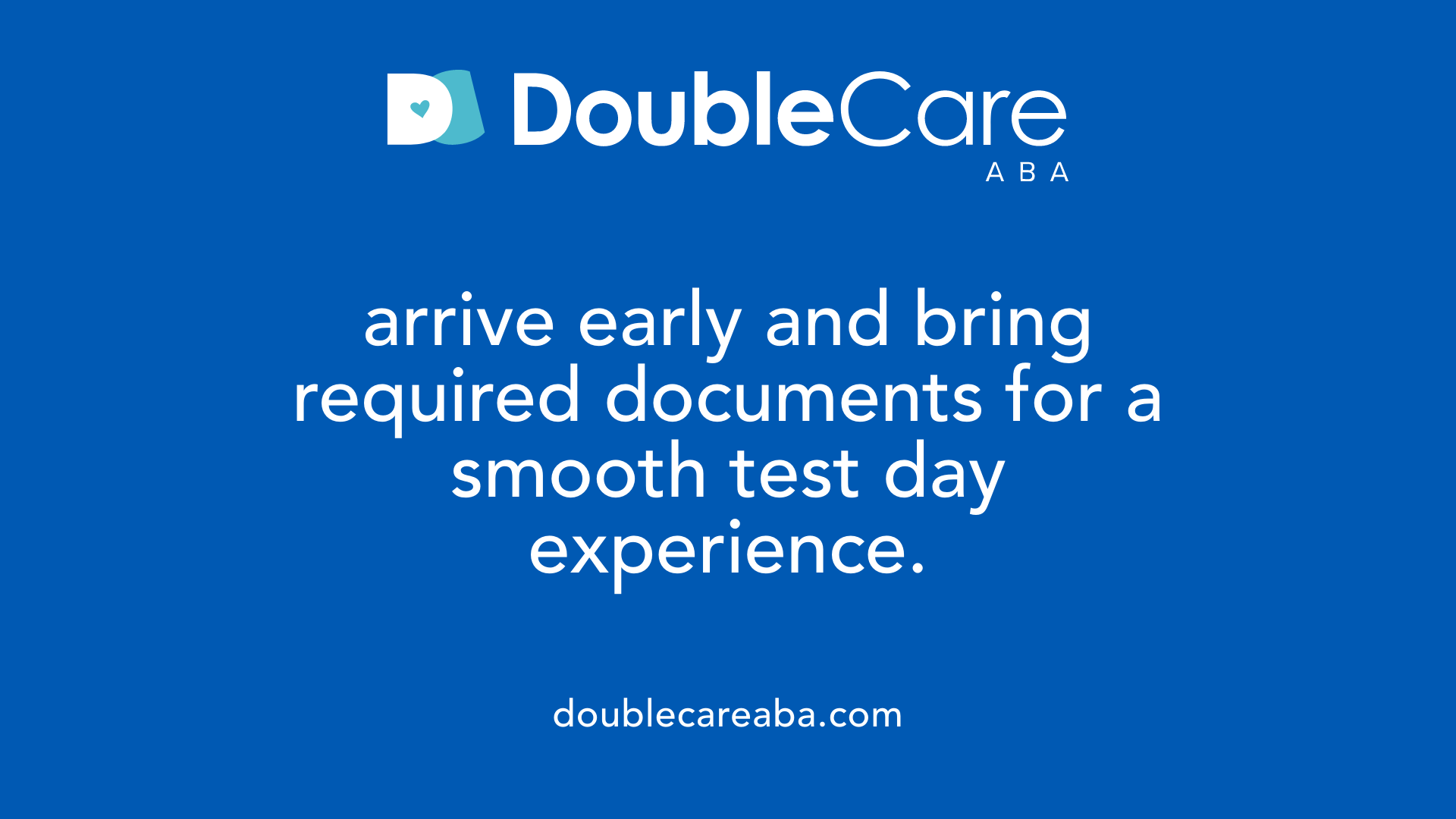
Arriving early
On the day of the BCBA exam, it is essential to arrive early at the Pearson VUE testing center. This allows ample time to check in, settle in, and avoid any last-minute stress. Remember to bring required documentation such as a valid photo ID and any registration confirmation materials. Being punctual helps you start the test with a clear mind and a relaxed attitude.
Required documentation
Candidates need to carry proper identification, usually a government-issued photo ID, to verify their identity at the testing center. Confirm all registration details beforehand to ensure you bring the correct documents. Having your exam confirmation email or voucher can also streamline the check-in process.
Managing time during the exam
Given that the BCBA exam consists of 185 multiple-choice questions, effective time management is crucial. Pace yourself so that you have enough time to answer all questions thoroughly. Mark difficult questions for review and consider returning to them after completing the easier ones. If the testing center permits, take short breaks to rest your eyes and mind, helping maintain focus throughout the exam.
Breaks and relaxation techniques
Since test anxiety can impact performance, practicing relaxation techniques like deep breathing, progressive muscle relaxation, or positive self-talk can be beneficial. Use breaks strategically to relax and reset your focus, but be mindful of the allotted break times to avoid rushing through your questions afterward.
Question approach strategies
Approach each question methodically by reading carefully and eliminating obviously wrong answers. Trust your preparation and knowledge of the relevant task list. Stay calm and confident, and don’t rush through questions as this can lead to mistakes. Remember, the scoring is scaled, and the goal is to demonstrate your understanding of ABA concepts effectively.
By following these tips, candidates can enhance their test-day performance, making the exam experience smoother and increasing their chances of success.
Understanding Screening and Scoring Policies
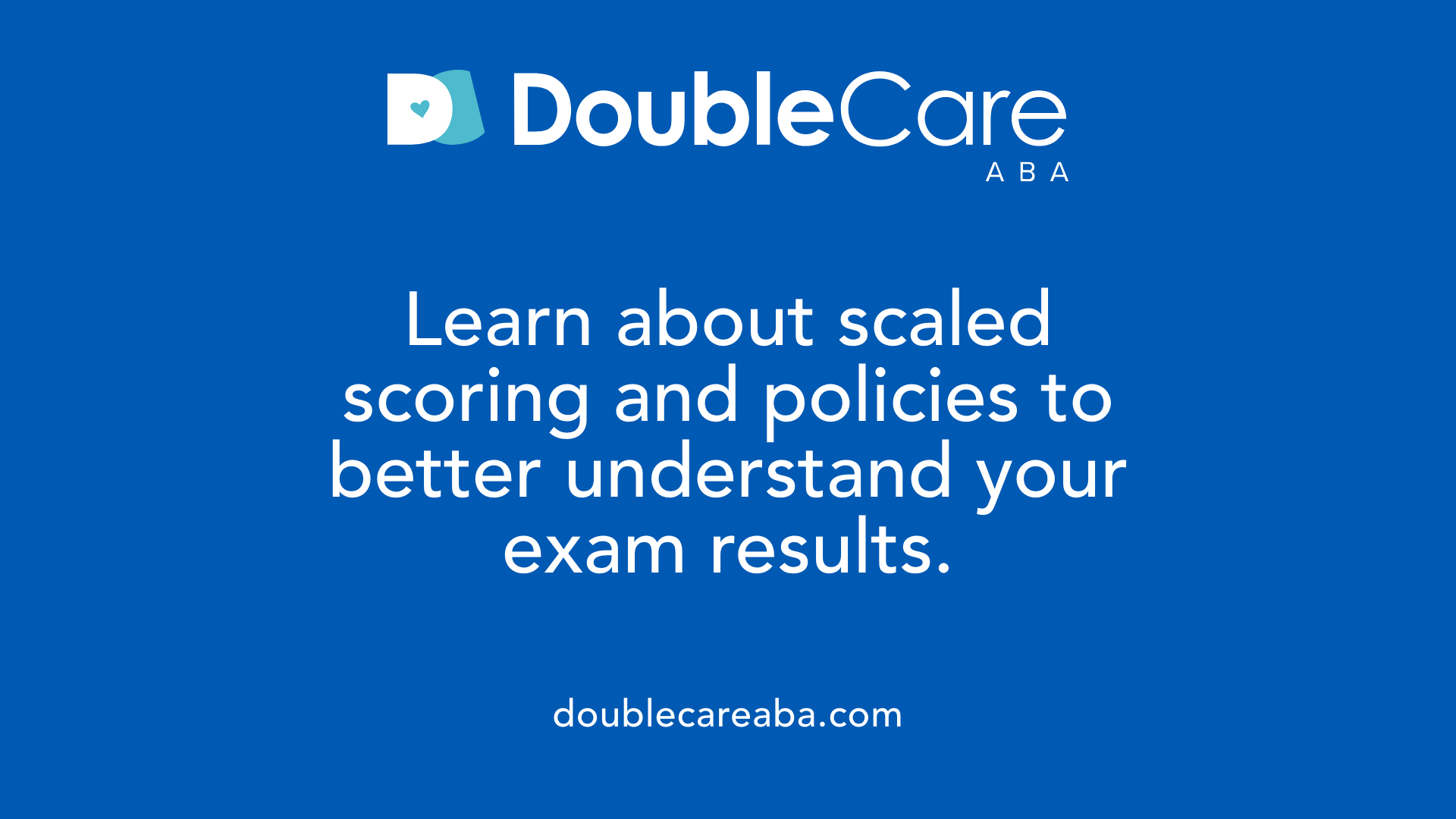
How is the scoring of the BCBA exam determined, and what policies and procedures should candidates be aware of?
The BCBA exam is scored using a scaled scoring system, which ensures consistency and fairness across different test forms. Instead of providing raw scores (the number of questions answered correctly), the BACB converts these into scaled scores using a method called the modified Angoff procedure. This approach adjusts scores based on the difficulty of each exam version, making them comparable regardless of which form a candidate takes.
The passing score is set through this criterion, allowing the exam to uphold a standard of competence. Since scores are scaled, individual raw scores are not publicly disclosed. Instead, candidates are informed of their pass or fail status immediately after completing the exam at the testing site. Official results, including the scaled score, are then sent via email within about a week.
Candidates should be aware of some crucial policies. These include rules on exam retakes, which typically involve fees and specific timing rules, as well as confidentiality policies to protect exam integrity. Familiarity with the scoring process and policies ensures candidates can navigate the certification process smoothly and focus on preparing effectively for the exam.
Policies and Procedures for Exam Administration
Rescheduling and cancellation policies
Candidates should be aware that if they need to reschedule or cancel their exam, they must adhere to specific timing restrictions. Any rescheduling or cancellation requested within 48 hours of the exam date will incur fees. Policies also state that rescheduling or cancellations made outside this window may also involve charges, depending on the timing and circumstances.
Fees for rescheduling or cancellation
Fees vary based on how close to the exam date the rescheduling or cancellation occurs. Candidates are advised to review the official policies carefully to understand the exact fee structure, which is designed to encourage timely decisions and help candidates avoid unnecessary costs.
Timing restrictions
Candidates are restricted from rescheduling or canceling their exam within 48 hours of the scheduled date without incurring fees. This policy helps to ensure fairness and stability in exam scheduling, allowing the BACB to manage testing center resources effectively.
Confidentiality and retake policies
The BACB maintains strict confidentiality regarding exam content and results. Candidates are assured that their scores, whether pass or fail, are kept confidential, with only scaled scores and pass/fail statuses disclosed. For retakes, candidates must follow specific procedures if they fail the exam. Multiple retakes are allowed, but candidates should be aware of any waiting periods and associated rules.
This structured approach to policies ensures a fair, secure, and transparent testing process. Candidates are encouraged to consult the official BACB documentation for detailed information about policies, procedures, and any updates related to exam administration.
Role of Practice and Simulation in Exam Preparation
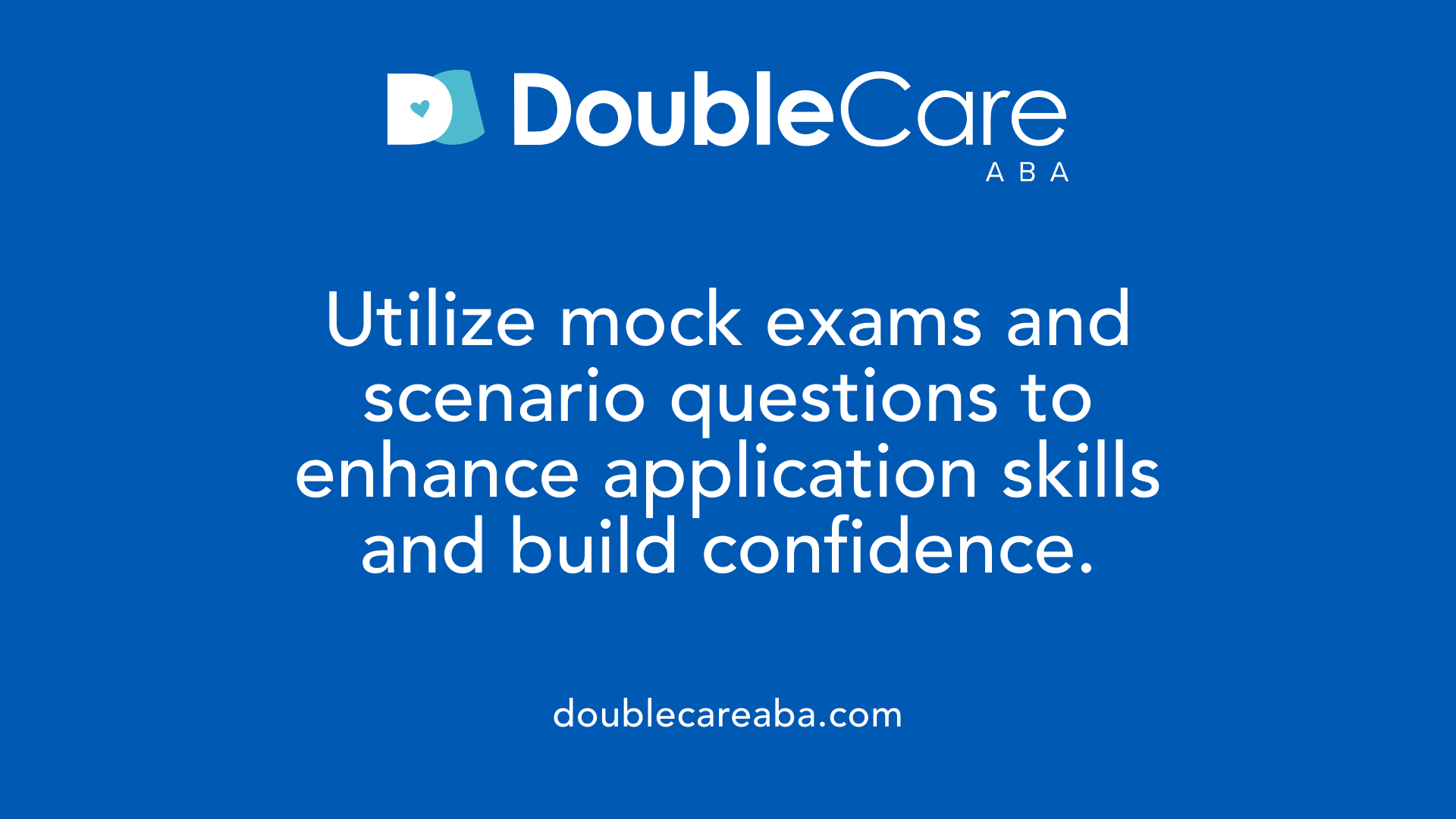
Why are mock exams essential?
Practicing with mock exams is a crucial step in preparing for the BACB certification tests like BCBA, BCaBA, or RBT. These practice tests help candidates familiarize themselves with the format, timing, and types of questions they will encounter. They also highlight areas that need further study, allowing for targeted review.
How do scenario questions enhance understanding?
Scenario questions often mimic real-life situations and test a candidate’s ability to apply theoretical knowledge practically. Working through these questions enhances problem-solving skills and prepares candidates to handle complex case studies in real-world settings.
Can applying concepts to real situations improve exam success?
Applying learned concepts to actual or simulated situations deepens understanding. Using tools like SAFMEDS flashcards, online courses, or case examples enables candidates to see how their knowledge functions in practice, boosting confidence and proficiency.
Additional tips for effective preparation
Creating a study schedule, practicing with mock exams, and reviewing exam-specific content areas regularly improve performance. Engaging actively with practice questions and scenario-based tasks reinforces learning, making it easier to recall information during the test.
| Practice Technique | Description | Benefits |
|---|---|---|
| Mock exams | Full-length simulated tests | Time management, exam familiarization |
| Scenario questions | Application-based questions | Practical problem-solving skills |
| Real-life application | Applying concepts to real or simulated settings | Better understanding and retention |
Focusing on these areas can significantly boost a candidate’s readiness, ensuring they approach the exam with confidence and competence.
Building Confidence and Reducing Exam Anxiety
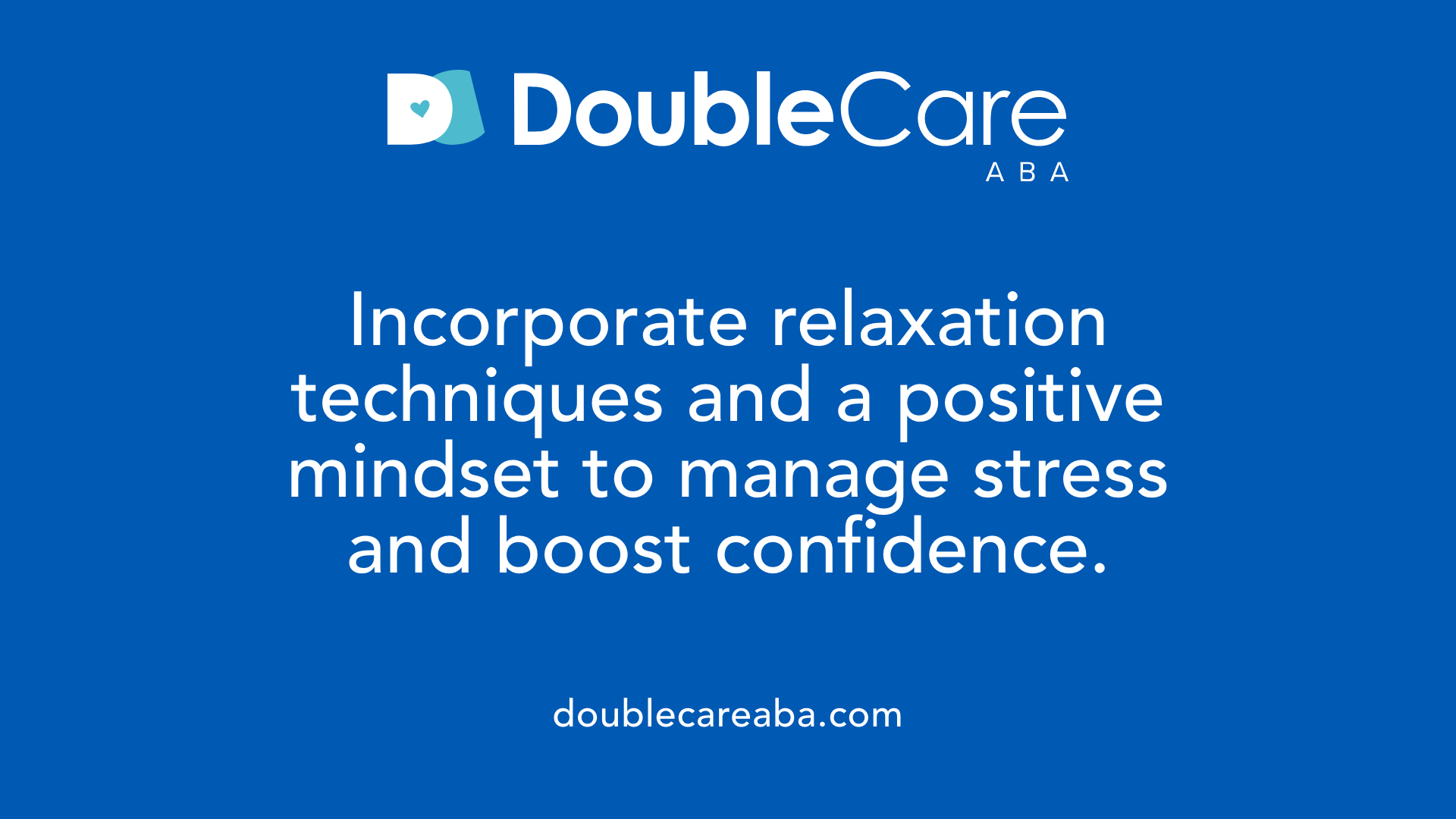 Preparing for the BACB certification exam can be stressful, but developing a comprehensive approach can help reduce anxiety and boost confidence.
Preparing for the BACB certification exam can be stressful, but developing a comprehensive approach can help reduce anxiety and boost confidence.
One effective way to calm nerves is to practice relaxation techniques. Deep breathing exercises, progressive muscle relaxation, and mindfulness meditation can help calm the mind and body, making it easier to focus during studying and on exam day.
Establishing a solid preparation routine is essential. This includes creating a study schedule that covers all content areas, taking regular mock exams to assess your progress, and reviewing relevant materials like the BCBA handbook. Consistent practice not only boosts knowledge but also builds confidence.
Adopting a positive mindset is equally important. Visualize success, affirm your abilities, and focus on your preparation efforts rather than potential negative outcomes. Remember, passing the exam is achievable with diligent preparation.
Incorporating these strategies into your prep plan can significantly reduce exam-related stress. Combining relaxation techniques, structured routines, and a positive outlook will help you approach your BCBA exam day with greater confidence and calmness.
Navigating Your Path to Certification
Successfully passing the BCBA exam requires a combination of thorough understanding, strategic preparation, and confidence-building techniques. By familiarizing yourself with the exam structure, utilizing high-quality study resources, and practicing effective test-taking strategies, you can enhance your readiness. Remember to adhere to policies regarding exam policies and procedures, stay physically and mentally prepared, and approach exam day with confidence. This comprehensive approach will position you for success on your journey toward becoming a certified behavior analyst.
References
- EXAMINATION INFORMATION - Behavior Analyst ...
- Best BCBA® Exam Prep Study Materials to Pass ...
- How to Start Studying for the BCBA Exam: A Step-by- ...
- Key BCBA Exam Study Guide for Success
- BCBA Exam Study Guide & Preparation Tips
- BCBA Exam Advice, Strategies, and Tips
- How to Pass the BCBA Exam: Strategies for Success
- How to Pass the BCBA Exam: Tips, Tools, and Strategies ...
- 8 Study Strategies for the BCBA® Exam - Tackling the Test ...
















